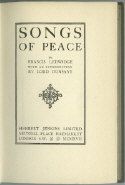Reilly 196.
Ledwidge, Francis Edward (1887–1917), poet, was born on 19 August 1887 at Janeville, Slane, co. Meath, Ireland, the eighth of the nine children of Patrick Ledwidge, an itinerant farm labourer (d. 1892), and his wife, Anne Lynch (1853/4–1926), a native of Slane. Of German origin, the name Ledwidge (also Ledwich, Ledwith) came to co. Meath with the Anglo-Normans. Patrick Ledwidge's premature death forced his wife and children out to work. Aged thirteen, Francis (Frank) Ledwidge left Slane national school to become a farmer's boy at 7s. a week. Strongly built, with a sensuous face and striking brown eyes, Ledwidge educated himself and wrote poetry—sometimes on gates or fence posts. The poems reflect his passion for the Boyne valley. He also worked as a shop assistant, ‘yard boy’, road mender, copper miner, supervisor of roads. In 1910 he began to publish poems in the Drogheda Independent. His writing and a temporary job as secretary to the County Labour Unions (1913–14) gave him hopes of permanent white-collar work. Ledwidge had been a trade union activist since 1906 (he was sacked from the copper mine for organizing a strike). His politics were nationalist as well as left-wing. With his brother Joseph he founded the Slane branch of the Irish Volunteers (1914), which, like the broader movement, split on the conflict of loyalties produced by the First World War. Ledwidge opposed John Redmond's call for home-rulers to enlist, yet joined the 5th battalion, Royal Inniskilling Fusiliers (24 October 1914). His mixed motives may have included disappointment in love.
Ledwidge's patron, Lord Dunsany, although an officer in the Inniskillings, opposed his enlistment. In 1912 Ledwidge had sent poems to Dunsany, a Meath landowner and man of letters, who gave him money, literary advice, and the run of his library. He promoted Ledwidge's poetry in Dublin and London, and Ledwidge became acquainted with W. B. Yeats and Katharine Tynan. Songs of the Fields (1915) successfully appealed to the English taste for rural poetry and to expectations created by the Irish revival. Dunsany's preface says: ‘I have looked for a poet amongst the Irish peasants because … there was in daily use a diction worthy of poetry … an imagination capable of dealing with the great and simple things.’ A postscript mentions Ledwidge's enlistment. Ledwidge served as lance-corporal at Gallipoli and in Serbia. He injured his back in the retreat to Salonika (December 1915). Following leave in Ireland (May 1916) he was court-martialled for extending his stay and for expressing sympathy with the Easter rising. In December 1916 the army posted him to the western front. On 31 July 1917 he was killed by a shell at the third battle of Ypres. He was buried in Artillery Wood cemetery, Boesinghe, Belgium.
Ledwidge's posthumous Songs of Peace (1917) includes poems written on war service and a well-known elegy for Thomas MacDonagh, a poet-leader of the Easter rising. Dunsany edited Last Songs (1918) and Complete Poems (1924). A revised Complete Poems appeared in 1974. Seamus Heaney's elegy for Ledwidge (Field Work, 1979) dubs him ‘our dead enigma’. Ledwidge felt the irony of being called a British soldier while Ireland's political status was unacknowledged, but he was less conscious of aesthetic contradictions. Phrases like ‘this bee-sucked bough of woodbine’ (‘June’) owe more to Keats than to local observation and speech. Nor did war fundamentally disturb Ledwidge's romantic vision, and therefore his work has faded from view along with the double glamour of ‘peasant poet’ and ‘soldier poet’. Yet occasional intensity, powered by a history that recalls John Clare and anticipates Patrick Kavanagh, keeps Ledwidge alive. Francis Ledwidge: Complete Poems was published in 1974, and an edition of his Selected Poems appeared in 1993, with a foreword by Seamus Heaney.
E. Longley, Oxford Dictionary of National Biography
